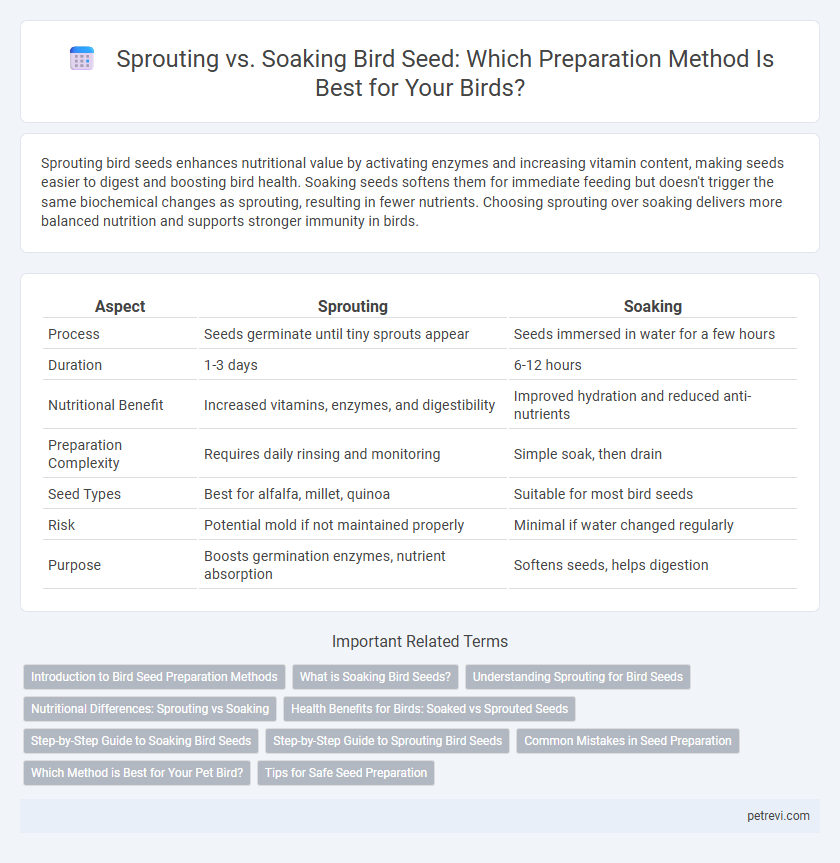Sprouting bird seeds enhances nutritional value by activating enzymes and increasing vitamin content, making seeds easier to digest and boosting bird health. Soaking seeds softens them for immediate feeding but doesn't trigger the same biochemical changes as sprouting, resulting in fewer nutrients. Choosing sprouting over soaking delivers more balanced nutrition and supports stronger immunity in birds.
Table of Comparison
| Aspect | Sprouting | Soaking |
|---|---|---|
| Process | Seeds germinate until tiny sprouts appear | Seeds immersed in water for a few hours |
| Duration | 1-3 days | 6-12 hours |
| Nutritional Benefit | Increased vitamins, enzymes, and digestibility | Improved hydration and reduced anti-nutrients |
| Preparation Complexity | Requires daily rinsing and monitoring | Simple soak, then drain |
| Seed Types | Best for alfalfa, millet, quinoa | Suitable for most bird seeds |
| Risk | Potential mold if not maintained properly | Minimal if water changed regularly |
| Purpose | Boosts germination enzymes, nutrient absorption | Softens seeds, helps digestion |
Introduction to Bird Seed Preparation Methods
Sprouting bird seeds enhances nutrient availability and digestibility by activating enzymes and increasing vitamin content, making them an excellent choice for bird seed preparation. Soaking seeds softens them and initiates the early stages of germination, which reduces anti-nutrients and promotes easier digestion for birds. Both methods improve overall seed quality, but sprouting offers additional benefits such as higher enzymatic activity and increased nutrient density for optimal bird health.
What is Soaking Bird Seeds?
Soaking bird seeds involves immersing them in water for several hours to soften the outer shell, making nutrients more accessible and easier to digest for birds. This method initiates the early stages of germination by activating enzymes that enhance vitamin and mineral availability. Soaked seeds reduce the risk of seed rot compared to leaving dry seeds out and help improve hydration for wild and pet birds alike.
Understanding Sprouting for Bird Seeds
Sprouting bird seeds enhances nutrient availability by activating enzymes and increasing levels of vitamins such as A, B, and C, which support avian health and digestion. Unlike soaking, which primarily softens seeds for easier consumption, sprouting initiates germination, producing beneficial antioxidants and promoting gut-friendly probiotics in birds. Regularly offering sprouted seeds can improve feather quality, boost immune function, and stimulate natural foraging behaviors in captive and wild bird species.
Nutritional Differences: Sprouting vs Soaking
Sprouting bird seeds enhances nutrient availability by increasing levels of vitamins such as vitamin C and B-complex while reducing antinutrients like phytic acid, leading to improved digestion and nutrient absorption. Soaking seeds primarily activates enzymes that begin breaking down starches and reduces anti-nutritional factors, but it does not significantly boost vitamin content as sprouting does. Both methods improve seed digestibility, yet sprouted seeds offer superior nutritional benefits compared to merely soaked seeds.
Health Benefits for Birds: Soaked vs Sprouted Seeds
Sprouted seeds enhance nutrient availability by increasing vitamins, enzymes, and antioxidants, boosting birds' immune systems and digestion. Soaked seeds improve hydration and reduce anti-nutrients like phytic acid, promoting better nutrient absorption and preventing digestive issues. Both methods support optimal bird health, but sprouted seeds offer a more comprehensive nutrient profile for growth and vitality.
Step-by-Step Guide to Soaking Bird Seeds
Soaking bird seeds involves immersing them in water for 8 to 12 hours to soften the outer shell and initiate nutrient activation, enhancing digestibility for birds. Begin by rinsing the seeds thoroughly, then place them in a clean container with filtered water, ensuring seeds are fully submerged and not overcrowded to prevent mold growth. After soaking, drain and rinse the seeds again before offering them to birds or proceeding to sprouting for increased nutrient availability.
Step-by-Step Guide to Sprouting Bird Seeds
Sprouting bird seeds involves soaking them in water for 8-12 hours, draining thoroughly, and rinsing twice daily until tiny shoots appear, typically within 2-4 days. This process enhances nutrient absorption by activating enzymes and increasing vitamin content, promoting better bird health and digestion. Using organic seeds like millet, quinoa, or alfalfa ensures safety and optimal growth during the sprouting cycle.
Common Mistakes in Seed Preparation
Common mistakes in bird seed preparation include soaking seeds for too long, which can lead to mold growth and harm birds. Sprouting requires careful monitoring of moisture and temperature to prevent fungal contamination and seed spoilage. Avoiding these errors ensures nutritious, safe seed for optimal bird health and growth.
Which Method is Best for Your Pet Bird?
Sprouting bird seeds enhances nutrient absorption and provides beneficial enzymes, promoting better digestion and immune support for pet birds. Soaking seeds reduces phytic acid and softens the seeds, making them easier to eat, especially for younger or weaker birds. The best method depends on your bird's species and health needs: sprouting offers superior nutrition for active birds, while soaking is ideal for sensitive or recovering pets.
Tips for Safe Seed Preparation
Sprouting bird seeds enhances nutrient availability and supports digestion, but seeds must be rinsed thoroughly every 8-12 hours to prevent mold growth and bacterial contamination. Soaking seeds for 12-24 hours softens them, making them easier to eat and reducing anti-nutrients like phytic acid, yet the water should be discarded and seeds rinsed to avoid promoting harmful microbes. Always use clean, fresh water and avoid prolonged soaking beyond recommended times to ensure bird seed remains safe and nutritious.
Sprouting vs Soaking for Bird seed prep Infographic

 petrevi.com
petrevi.com